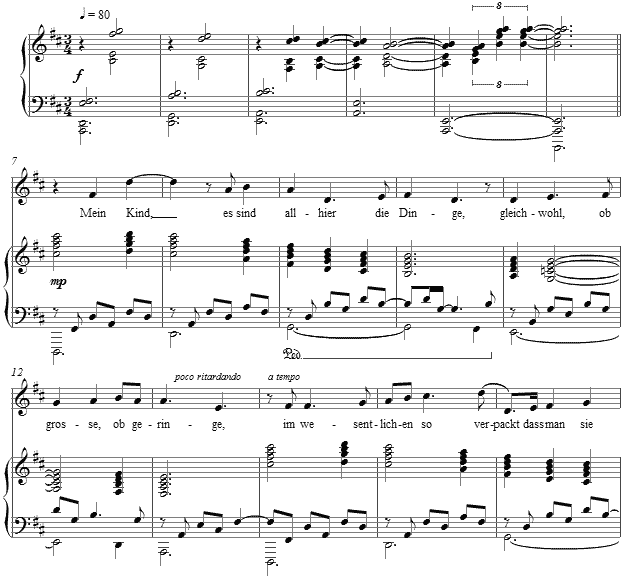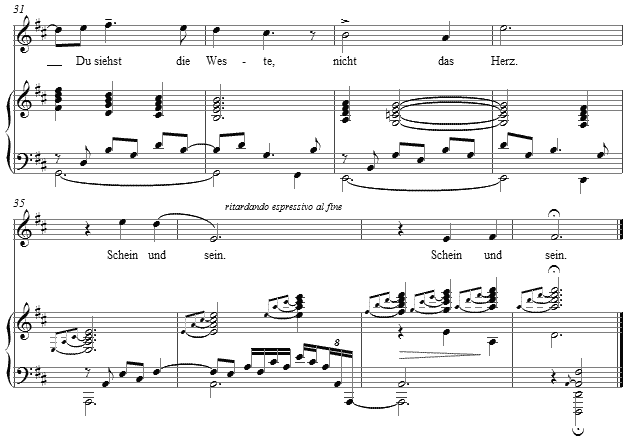Music and Texts of GARY BACHLUND
Vocal Music | Piano | Organ | Chamber Music | Orchestral | Articles and Commentary | Poems and Stories | Miscellany | FAQs
Schein und Sein - (2008)
Wilhelm Busch
for medium high voice and piano
Mein Kind, es sind allhier die Dinge,
Gleichwohl, ob große, ob geringe,
Im wesentlichen so verpackt,
Dass man sie nicht wie Nüsse knackt.
Wie wolltest du dich unterwinden,
Kurzweg die Menschen zu ergründen.
Du kennst sie nur von außenwärts.
Du siehst die Weste, nicht das Herz.[ 2 pages, circa 1' 30" ]
Wilhelm Busch
My child, things here are quite the same,
No matter whether big or small,
Or well presented,
That one cannot crack that nut.
Would you less than understand
The deep truth of men just like that?
You know them only from the outside,
Seeing the clothes, but not the man.
Style over substance is a so-called logical fallacy by which one emphasizes the way in which the argument is presented, while marginalizing and even ignoring the content of the argument. Style over substance is employed as a form of ad hominem attack. A logic professor of years back taught me that one using "style over substance" was admitting the weakness of an argument, though this was often difficult to convey to a crowd imbued with that debater's performing skills.
My mother told the old story having found a preacher's notes for a sermon, in which a margin comment in bold letters read, "Argument weak. Yell like hell!"
Physicist Alan Sokal wrote a postmodern-style essay in the journal Social Text titled most pompously "Transgressing the Boundaries: Towards a Transformative Hermeneutics of Quantum Gravity." It was of course academic nonsense and as such a critique in satire of those who would shield the weakness of their substance with heaps of style. This musical setting of Busch's observation begins with a stylish bravura, and the accompaniment is meant to be rhapsodic, perhaps overly so per the performers' "worst" instincts.
A simple strophic form as is Busch's verse, the second verse alters minimally as the vocal line rises to its highest tones with the assertion that one often sees "the vest" but not the heart.
This humorous observation is seen in so many ways. US comedian Stephen Colbert popularized "truthiness" in 2005 as a satirical term -- quite like "style over substance" -- to describe things that a person claims to know intuitively or "from the gut" without regard to evidence, logic, intellectual examination, or facts. This is seen in modern marketing wherein presenting something in an attractive way makes it better, of greater value, more right and so on. Australia's ABC published an article about the 2008 US campaigns entitled, "Triumph of style over substance," while the Boston Globe published an article titled, "Democrats emphasize style over substance," and Deutsche Welle published a critique of Sarkhozy and Merkel suggesting one was style without substance and the other substance without style. Lest this "logical fallacy" refer only to politics, one notes restaurant reviews, critiques of authors, and the expression is even used in the title, Style over Substance: A Critical Analysis of African American Teenage Subculture, by Ron Mills and Allen Huff, African American Images, 1999.
For all such reasons, it is recommended that this song be performed with " panache, verve, flair and elegance." In other words, overdone sarcasm.
The score for Schein und Sein is available as a free PDF download, though any major commercial performance or recording of the work is prohibited without prior arrangement with the composer. Click on the graphic below for this piano-vocal score.


